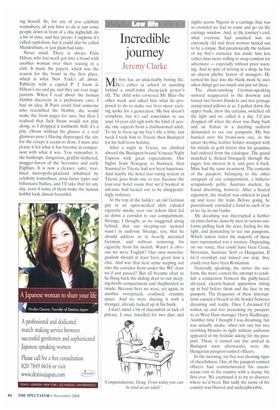Low life
Incredible journey
Jeremy Clarke
My boy has an undeniably boring life. He's either at school or standing behind a small-town cheap-jack grocer's till. The child who cornered Mr Blair the other week and asked him what he proposed to do to make our lives more exciting spoke for a generation. My boy doesn't complain, but it's sad sometimes to see your 14-year-old sigh with the kind of accidie one expects from a disillusioned adult. To try to liven up my boy's life a little, last week I took him to Trieste then Budapest for his half-term holiday.
After a night in Trieste, we climbed aboard the Budapest-bound Venezia Night Express with great expectations. Our flights from Newquay to Stansted, then Stansted to Trieste had not been luxurious. And maybe the hotel star-rating system in Trieste goes from one to ten, because the four-star hotel room that we'd booked in advance had turned out to be disappointingly ordinary.
At the top of the ladder, an old German guy in an open-necked shirt exhaled cigarette smoke over our tickets then led us down a corridor to our compartment. Strange, I thought, as we staggered along behind, that our sleeping-car steward wasn't in uniform. Strange, too, that he should address us in heavily accented German, and without removing his cigarette from his mouth. Wasn't it obvious we were English? Our own monolingualism should at least have given him a clue. And was that neat urine seeping out into the corridor from under the WC door we'd just passed? But all became clear as he flung back the sliding door to our sleeping-berth compartment and shepherded us inside. Because here we were, yet again, in another overpriced, confined, crummy space. And we were sharing it with a stranger, already tucked up in his bunk.
I don't mind a bit of discomfort or lack of privacy. I once travelled for two days and nights across Nigeria in a carriage that was so crowded we had to come and go via the carriage window. And, at the journey's end, what everyone had assumed was an extremely old and tired woman turned out to be a corpse. But paradoxically the tedium of my boy's existence has made him less rather than more willing to swap comfort for adventure — especially without prior warning. And in spite of serving in a shop, he has an almost phobic horror of strangers. He turned his face into the blank mask he uses when things get too much and just sat there.
The chain-smoking German-speaking steward reappeared in the doorway and tossed two brown blankets and two postage stamp-sized pillows at us. I pulled down the upper bunk, drew the curtains, switched off the light and we called it a day. I'd just dropped off when the door was flung back and an Italian in a dazzling uniform demanded to see our passports. My boy handed over his brand-new one, in the smart sky-blue leather holder stamped with his initials in gold letters that his grandma had ordered from the catalogue. The guard snatched it, flicked brusquely through the pages, lost interest in it, and gave it back. Mine had the same treatment. The contents of the passport, belonging to the other occupant of our compartment, a hitherto scrupulously polite Austrian student, he found absorbing, however. After a heated argument, the student was ordered to pack up and leave the train. Before going, he punctiliously extended a hand to each of us as we lay in our bunks.
My dreaming was interrupted a further six times before dawn by men in various uniforms pulling back the door, feeling for the light, and demanding to see our passports. Which nation states the majority of these men represented was a mystery. Depending on our route, they could have been Croat, Slovenian, Austrian, Serb or Hungarian. If we'd overslept and missed our stop, they could even have been Romanian.
Generally speaking, the tattier the uniform, the more earnest the attempt to establish a connection between the puffy-faced, slit-eyed, electric-haired apparition sitting up in bed before them and the face in my passport. The frequency of these interruptions caused a breach in the border between dreaming and reality. Once I dreamed I'd woken up and was presenting my passport to ex-West Ham manager Harry Redknapp. Another time I thought I was dreaming, but was actually awake, when not one but two ravishing blondes in tight military uniforms appeared at my bedside asking for my passport. These, it turned out (we arrived in Budapest soon afterwards), were the Hungarian passport-control officers.
In the morning, my boy was showing signs of cheerfulness. One of the passport-control officers had commemorated his unconscious visit to his country with a stamp, his first ever. We examined it to try to discover where we'd been. But sadly the name of his country was blurred and undecipherable.


























































































































 Previous page
Previous page